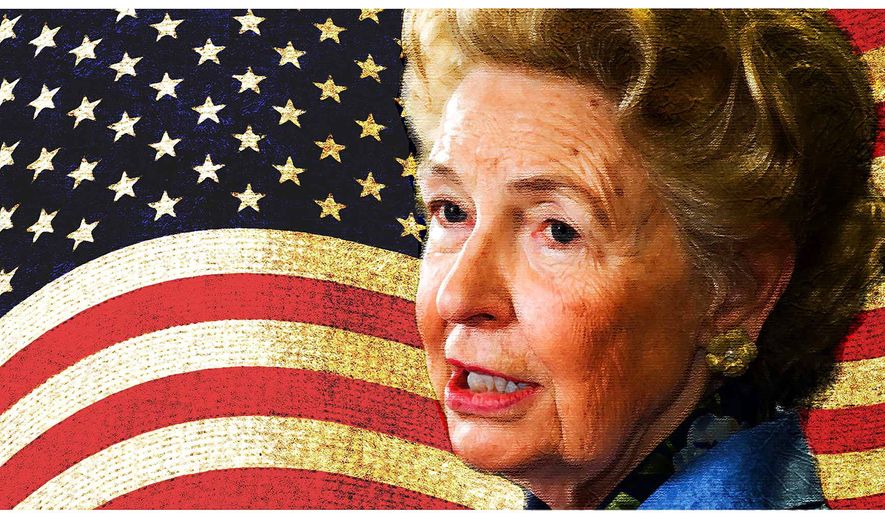OPINION:
Phyllis Schlafly’s death last weekend came not so much as a shock, but a surprise. Mrs. Schlafly was 92 years old and had stepped down as head of Eagle Forum, but many of those who knew her and worked with her find it difficult to imagine a world without the lady from Alton, Ill., who helped shape and lead the modern conservative movement. To say she’ll be missed goes without saying, and it’s hard to imagine another Phyllis Schlafly coming along anytime soon.
Her life and accomplishments boggle the mind. She finished college at 19, earned a Harvard master’s degree a year later, went to work during World War II test-firing machine guns destined for the fight against Germany and Japan, campaigned for Bob Taft in 1952, ran for Congress twice, wrote a book, “A Choice Not an Echo” that was read by millions in the ’60s and helped ignite the conservative revolution, almost single-handedly defeated the so-called “Equal Rights Amendment” everyone assumed was on its way to ratification in the ’70s, attended every Republican National Convention in the modern era to guarantee that the GOP’s anti-abortion plank she helped write remained in the platform, and did all this while writing 20 books, building Eagle Forum into a political super group, and raising six kids.
Phyllis was tireless and gutsy enough to take on anyone. During a debate over the ramifications of the Equal Rights Amendment, a critic claimed she didn’t know what she was talking about because she wasn’t an attorney. Phyllis immediately enrolled in law school and in 1978 was admitted to the bar. She was a great debater and never went into a debate or appearance without control of the facts and yet, through it all she was a lady, something feminists just couldn’t stand. One left-wing website in announcing her death over the weekend noted that it had come “not a moment too soon.”
The obituaries that appeared in the wake of her death invariably described her as a leading anti-feminist, anti-abortion and pro-family leader and she was all those things. But much more. She was an ardent anti-Communist, wrote books about the need to strengthen our defenses in the ’70s and ’80s, and was a founder of the Cardinal Mindszenty Foundation, named for the Hungarian Catholic Cardinal who was imprisoned during World War II by the Nazis and then tortured and sentenced to death by the Communists when they gained control of his native Hungary. He spent eight years in a Communist prison, was released and sought asylum in the U.S. Embassy when the Communists regained control. He spent 15 years there and became a symbol of opposition to tyranny of all kinds.
I knew Phyllis first when I served as chairman of Young Americans for Freedom in the ’60s, and as a fellow American Conservative Union board member in the ’70s. We didn’t always agree, but we were friends. She valued the movement she helped start and build, was always willing to mentor and help young activists, and never stopped fighting to advance her beliefs. Sometimes this meant fighting with your friends; we fought each other during the battle for a balanced budget amendment in the ’80s and differed on issues and often found ourselves supporting different candidates for office, but at the end of the day we remained friends and allies. Her last battle within the movement was with Sen. Ted Cruz’s supporters in Texas who couldn’t understand her support for Donald Trump and tried unsuccessfully to oust her from the leadership of her own organization; they didn’t understand that she would never have done that to them had their roles been reversed.
I was asked to say a few words at her 80th birthday celebration and told the story of a similar dinner held a year before honoring one of my mentors, the late Walter Judd. In those days the emcee read telegrams and messages from those who for one reason or another couldn’t be present, and the first one read that evening was from Lowell Thomas, a famous journalist of the era and one of Dr. Judd’s closest friends. Thomas couldn’t be there because the just-married reporter was, at the age of 88, in Alaska on his honeymoon cruise. The telegram began “Oh, to be 80 again .”
A couple of years ago, Phyllis — who I, like all who knew her, regarded as ageless — leaned over to me at a dinner and said, “You know, I didn’t really appreciate that story when you told it, but now I get it.” She didn’t stop at 80 or 90, and her final book touting her support of Mr. Trump is being published posthumously.
Phyllis may have had her enemies, but most of those with whom she battled respected her and admired her tenacity, while those of us who knew her loved her and shall miss her, for she was truly the queen of conservatism.
• David A. Keene is opinion editor at The Washington Times.




Please read our comment policy before commenting.